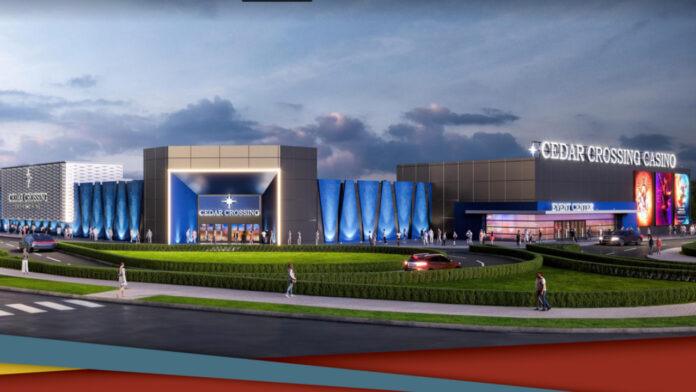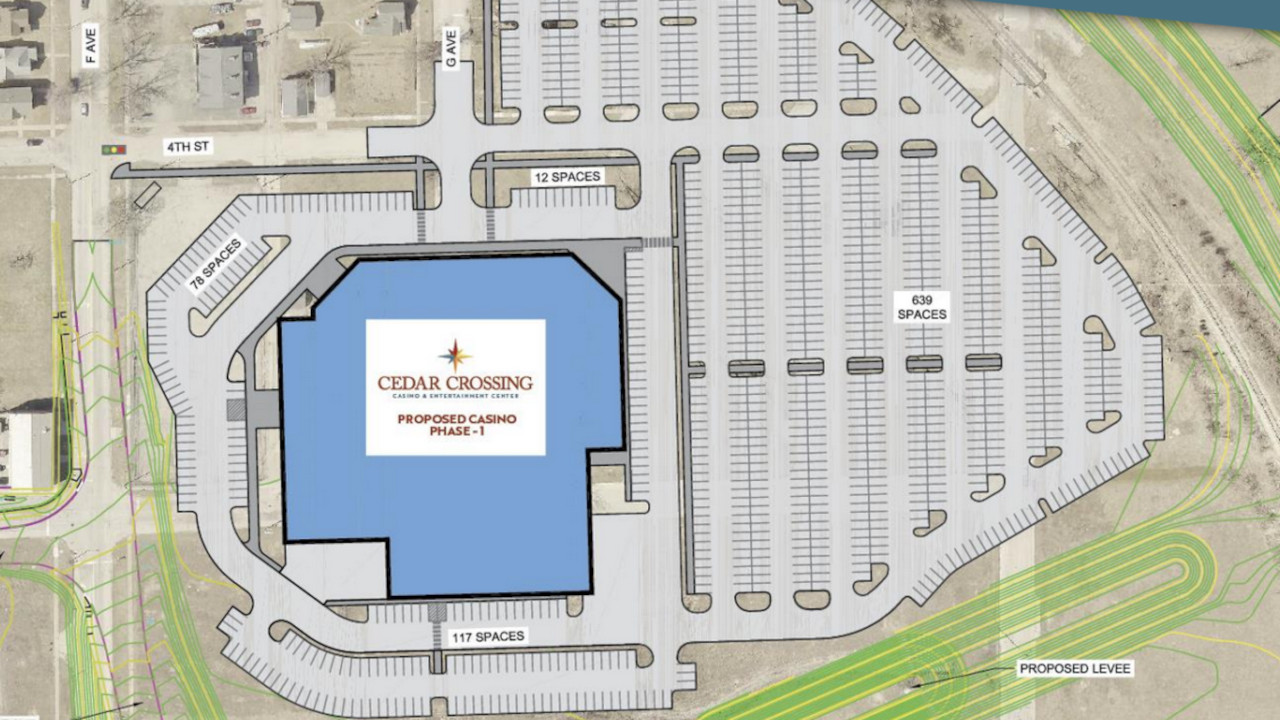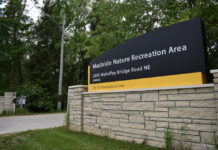
From three live entertainment venues and three restaurants to an arts and cultural center that will periodically be transformed into a STEM lab, the new Cedar Crossing casino in downtown Cedar Rapids will provide much more than a new gaming option in Eastern Iowa, leaders say.
Casino proponents held a news conference Monday, Sept. 16 to update plans for the proposed $275 million casino project, which still must be approved for a gaming license by the Iowa Racing and Gaming Commission (IRGC) before construction can begin.
New Cedar Crossing renderings were unveiled, as well as details on amenities of the casino complex and details of a market study commissioned by the casino’s developer, Peninsula Pacific Entertainment (P2E).
Cedar Rapids Mayor Tiffany O’Donnell, a longtime casino proponent, said the latest plans for Cedar Crossing will provide entertainment options across a wide spectrum.
“This is an entertainment facility that happens to have a casino in it,” Ms. O’Donnell said. “There’s so much in addition to the casino, in terms of entertainment. I think what also makes us unique is the local investors’ recognition that we have an entire community that we want to support.”
Peninsula Pacific Entertainment president Jonathan Swain said Cedar Crossing, projected to encompass 160,000 square feet and more than 1,100 on-site parking spaces, will feature three live entertainment spaces, including a 1,500-seat venue “that will host top-tier performances and events drawing visitors from across the state and beyond.”
The venue could also host sporting events (including MMA events, boxing and 3-on-3 basketball), comedy shows, special events, festivals and trade shows, according to materials provided at the news conference.
“We want to draw people with entertainment, with hundreds of live performances a year,” said Mr. Swain, whose company has also developed other casinos across Iowa. “That is our experience in Sioux City, that is our experience in Dubuque. That tells us that that helps lift businesses downtown, especially hotels, bars and restaurants, bringing people to see our shows and have them stay overnight at a downtown hotel and visit businesses here. That’s what it’s all about. A high tide raises all boats.”
Mr. Swain outlined plans for three new restaurants at Cedar Crossing – Zach Johnson’s Clubhouse, developed with the PGA golfer and Cedar Rapids native, featuring steaks, chops and craft cocktails; World’s Fair, offering street foods such as Indian street tacos, Korean crispy chicken, Mediterranean wraps, crepes and churros; and the River’s Edge Smokehouse and Tap, with pub burgers, pulled pork, beef brisket and barbecued ribs.
He also introduced plans for a dedicated arts and cultural center, the first of its kind at an Iowa casino. The venue would feature rotating exhibits in partnership with the National Geographic Society, and would occasionally be transformed into a STEM (Science, Technology, Engineering and Mathematics) lab accessible to local students, as part of a partnership with 2020 Miss America Camille Schrier, the first Miss America to use a science demonstration as her talent.
Mr. Swain said the cultural center will have a separate entrance so it can be entered by those under age 21 without having to traverse the gaming floor.

Financial factors
Mr. Swain said a number of new factors make a stronger case for a new casino in Cedar Rapids.
First, he said, there are 40,000 new residents of Linn and Johnson counties since the IRGC last considered a casino license for Linn County – twice the growth rate of the state of Iowa overall.
Second, sports and gaming betting in Iowa has grown substantially, from $1.5 billion in 2017 to more than $2 billion in 2023.
“As a result, the Iowa operators, many that have opposed this project, are recording record (profits) because of that increase in population and the increase in the revenues that they are the beneficiary of,” he said.

Third, he said, gaming operators in Nebraska and Illinois are investing billions in new gaming facilities, siphoning revenue from Iowa casinos, and, while not naming specific companies “some of those operators … own those facilities in Iowa and Illinois (and) have historically opposed this project.”
“Competition is coming,” he said. “It’s here today, and more is coming in the future in Nebraska.”
Projections from P2E indicate the state might lose as much as $256 million in gaming revenue to Nebraska when that state’s permanent casino projects are completed.
And the fourth and fifth reasons involve the project itself, Mr. Swain said – “significant enhancements” that comprise an investment $100 million higher than last proposed in 2017, primarily focused on “non-gaming amenities,” and a commitment to donate 8% of casino revenue to area nonprofits, the highest such pledge of all Iowa casinos, generating an estimated $6.3 million in annual charitable contributions.
The casino floor itself, he said, will comprise 700 slot machines and 22 table games.
“Cedar Crossing entertainment center is the right project for Cedar Rapids and for Iowa, and it takes into account the changes in Iowa gaming market,” he said. “At a $275 million investment, Cedar Crossing will be one of the largest gaming projects in the history of Iowa, located in downtown Cedar Rapids. It will push to continue what has already started, the great revitalization of downtown.”
Economic impact
Ms. O’Donnell said Cedar Crossing will be the realization of a vision that’s been pursued by local supporters since 2013.
“This casino, in our view, will deliver on a promise to the voters who overwhelmingly said that they wanted the same opportunity here that others in our state have been granted, merely the chance to game and be entertained in our city – which, by the way, is the second largest in our great state,” she said. “The city has been clear that it supports the will of the people, which is the construction of a casino.”
Linn County voters have approved two referendums supporting gaming in Linn County, most recently in November 2021. As a result of the second vote, developers are now allowed to seek a casino license for the county in perpetuity, without returning to voters for further approvals.
She also said the project is backed by backed by “an overwhelming number of business leaders and nonprofit organizations,” as well as more than 60 local investors, “all of whom believe deeply in the positive impact this casino will have on Cedar Rapids. It is not just about gaming – it is about growth, opportunities and revitalization.”
She mentioned that the site for the proposed casino – the former Cooper’s Mill hotel and restaurant – has sat empty, and off the tax rolls, since the buildings were demolished in the wake of the city’s 2008 flood.
“Cedar Crossing will be a compelling reason to stay and build lives and futures here,” she said. “For the northwest side of the Cedar River, it’ll serve as an anchor for much-needed redevelopment, breathing life into an area that has long awaited its renaissance. (Since the flood), we’ve witnessed remarkable recoveries in our many districts downtown – Czech Village, New Bohemia, Kingston Village, have all emerged stronger than ever, and now it’s time for another revitalization.”
According to estimates from P2E, Cedar Crossing will generate $66 million in spending annually in the state and support 524 full-time jobs; will provide $1.9 million in sales taxes, $1.1 million in income taxes and more than $21 million in state gaming taxes per year; the city of Cedar Rapids would receive $2.3 million in gaming revenue, while Linn County would get $502,000; the City of Cedar Rapids and Linn County are projected to receive $2.3 million and $502,000, respectively, annually in gaming revenue; and Linn County would get $322,000 in annual sales taxes.
Projections also indicate the new casino will draw more than 1 million visitors to Cedar Rapids per year.
“This influx of tourists will be a tremendous opportunity for our local businesses, for hotels to restaurants, creating what we know will be a ripple effect for economic prosperity through our entire region,” she said. “And maybe, just maybe, some of those visitors will see what so many of you have seen, that our metro is growing, a vibrant community with a boundless future, and they too will opt to stay here, growing our population.”
Another key factor, Ms. O’Donnell said, is the financial backing of local supporters – not just outside interests.
“I think that’s a difference, when you have local investors,” she said in comments after the news conference. “These are people that you know, that are going to the grocery store, that are going to be accountable to this project. I think that’s what makes this such a unique project, and perfect for a town like Cedar Rapids, that really values that local ownership.”
In response to a question from Cedar Rapids council member David Meier regarding the casino’s potential impact on smaller local businesses, Mr. Swain said the casino will not only provide a shuttle to various area destinations, but will offer a “point partnership” program, under which casino patrons can redeem casino rewards credits at any participating Cedar Rapids business, including local hotels and restaurants.
“Our goal, again, is to try to raise all levels of business for everyone, if they want to actually become business partners with us,” he said. “It costs nothing at all. Just sign up for that program, and our customers and our tourists can take their car right over to your business and use their rewards credit that we pay for.”

Kirsten Running-Marquardt, chair of the Linn County Board of Supervisors, said the casino would help draw new residents to the area, as well as retaining the existing younger population.
“We need to attract new people, we need to keep our young here and welcome back all those who have left,” she said. “Many of you, like myself, have friends and family. People have kids and grandkids. We need them all to come back home. We need them as part of our workforce, our community, and our economy can together strongly move forward. To make this happen, we need to give people opportunities for fun things to do, like this project with gaming and entertainment. Those things can be a fun, attractive thing for people to do. It will be another reason for people to live here, work here and raise their families.”
Echoing comments from Ms. O’Donnell, Ms. Running-Marquardt also stressed that Linn County gaming supporters aren’t asking for special consideration from the IRGC.
“We are only looking for a fair chance, from the Racing and Gaming Commission, from the legislature and from the governor,” she said. “We want this fair chance and the same rules that other communities have had to abide by, like so many other communities around the state, the ones that have benefited from projects like this. We want a fair shot, and if we get one, we can make this opportunity a reality for our community.”
Mike Sadler, president of the Cedar Rapids and Iowa City Building and Construction Trades Council, said the Cedar Crossing project is expected to create over 900 local building trades jobs on site and over 800 indirect jobs throughout the Corridor and the state – a total of 1,700 jobs.
“Cedar Crossing will will also mean new careers and an improved standard of living for so many people who are building their own future,” he said. “The project is the first major investment in Cedar Rapids’ northwest side in decades. It’s the closest we have been to bringing to life a project that has been more than a decade in the making. Imagine the potential positive economic impact to this city and this county from the construction and operation of a facility such as the one presented today.”
Market study data
The new market study released Monday, conducted by Convergence Strategy Group (CSG) of New Orleans, claims that a new Cedar Rapids casino would provide $80.2 million in new gaming revenue in Iowa – more than the $51 million in new projected revenue from the IRGC’s 2021 market study.
The higher revenue projections from the P2E-commissioned study are due to higher revenue for the statewide gaming industry as a whole, according to Mr. Swain.
It also projects lower cannibalization rates from existing casino revenues than previous studies, indicating that current casinos would lose just $27.8 million to Cedar Crossing. Riverside Casino would see the largest impact, with an 11.6% revenue drop, followed by the Isle Casino Hotel in Waterloo with a 5.8% drop and the Diamond Jo and Q casinos in Dubuque with a collective 3.6% drop.
Suzanne Leckert, co-founding partner of CSG, said the study used aggregated cell phone data to reach its conclusions. That data, unavailable for previous studies, provides extensive information about casino patrons’ consumer habits using apps on people’s phones – “highly accurate” data that tracks behaviors using precise locations, without revealing specific personal information.
“Previously, when firms such as ours would model things such as a casino, we had to make a lot of guesses about where people were coming from,” Ms. Leckert said. “With this cell phone data, it takes out the guessing. For the first time, we can see actual visitation, and our models can be accurate in a way never before possible.”
Ms. Leckert also dismissed the notion that since her firm’s study was commissioned by P2E, it might provide data favorable to the Linn County casino group.
“We are an independent firm,” she said. “Our clients don’t tell us what our conclusion should be, and we don’t take that kind of direction from them. If we did, we wouldn’t be in business any more. Our business is in providing the most sound professional analyzes and projections possible in the industry. Yes, we’re paid by them, but they pay us to provide an objective opinion, and they don’t know what the numbers are going to be until we’re finished with our projections and our analysis.”
Next steps
Peninsula Pacific Entertainment and the Linn County Gaming Association jointly applied for a gaming license with the IRGC in August, and will make a formal presentation on their plans to the commission at their Oct. 3 meeting at the Isle of Capri Casino in Bettendorf.
A site visit and public input session is slated for Nov. 20 in Cedar Rapids at a location to be determined.
The door was opened for a new Linn County gaming license application after a two-year state gaming license moratorium imposed by the Iowa Legislature was allowed to expire June 30.
The IRGC has twice rejected casino proposals for Linn County, in 2014 and 2017, after commissioners largely sided with opponents who argued the state’s gaming market was saturated and a new Linn County casino would substantially “cannibalize” revenue from existing state-licensed casinos.
But all five members of the IRGC are newly-appointed since the last decision, raising supporters’ hopes of receiving a license.
A pair of market studies commissioned by the IRGC are due by the end of December, and the commission is slated to vote in a special meeting Feb. 6, 2025 whether to approve or reject the Linn County gaming license applications.




